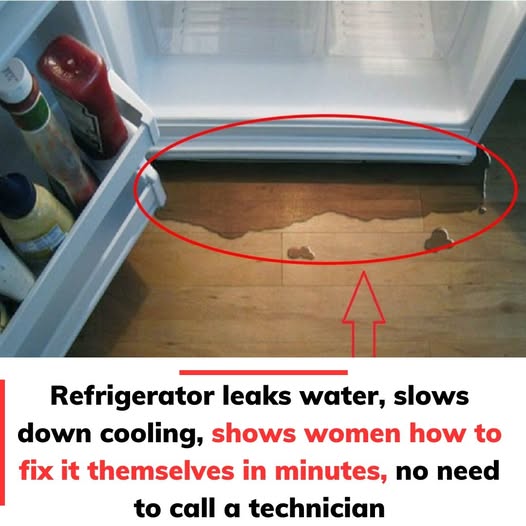ADVERTISEMENT
4. Overfilled Drain Pan
Refrigerators have a drain pan located at the bottom that collects water from the defrost cycle. If this pan becomes too full or becomes misaligned, it could leak water onto the floor.
Solution: Empty the drain pan and make sure it is properly positioned. If the pan is cracked, replace it with a new one.
5. Broken or Leaking Water Filter
Many modern refrigerators have water dispensers or ice makers that require a water filter. If the water filter becomes clogged or is leaking, it could lead to water pooling in the fridge. This can also affect the cooling performance.
Solution: Check the water filter and replace it if it’s clogged or leaking. Follow the manufacturer’s recommendations for changing the filter.
Why Is Your Refrigerator Slowing Down in Cooling?
Alongside leaking water, if you notice that your refrigerator is taking longer to cool or failing to maintain a consistent temperature, several underlying issues may be contributing to this problem.
1. Dirty Condenser Coils
The condenser coils are responsible for releasing heat from inside the fridge. If they become dirty or clogged with dust, dirt, or pet hair, they will be less efficient at releasing heat, causing the refrigerator to work harder to cool down. This can lead to poor cooling performance.
Solution: Unplug the refrigerator and clean the condenser coils with a vacuum or a coil brush. Regularly cleaning the coils will help maintain proper cooling and prevent overworking the compressor.
2. Compressor Issues
The compressor is a vital component that pumps refrigerant through the system to maintain cooling. If the compressor is malfunctioning, the refrigerator will struggle to cool effectively. A faulty compressor may also be responsible for the water leakage if it’s working inefficiently and causing excess condensation.
Solution: If you suspect the compressor is failing, it’s best to call a professional technician. Compressors are complex and require expert repair or replacement.
3. Thermostat Problems
The thermostat controls the temperature inside the fridge. If the thermostat is malfunctioning, it may not signal the refrigerator to cool properly, leading to inconsistent or insufficient cooling. This issue can also be responsible for fluctuating water levels inside the fridge.
Solution: Test the thermostat with a thermometer to see if it’s reading correctly. If it’s faulty, consider replacing the thermostat with a new one.
4. Blocked Air Vents
Refrigerators rely on air circulation to maintain an even temperature throughout the appliance. If the air vents are blocked by food items or ice buildup, it can restrict airflow, causing the fridge to cool more slowly. This can also contribute to moisture buildup and leaks.
Solution: Inspect the vents inside the fridge and freezer to ensure they are not obstructed. Move items away from the vents to allow proper airflow, and consider defrosting the freezer if there is any ice buildup.
5. Low Refrigerant Levels
Low refrigerant levels can significantly impact your fridge’s cooling efficiency. If there’s a refrigerant leak, the cooling system may not be able to produce enough cold air, leading to a slow or ineffective cooling process.
Solution: Refrigerant leaks require professional attention. If you suspect a leak, call a licensed technician to inspect and refill the refrigerant.
How to Prevent Future Leaks and Cooling Issues
Preventing future refrigerator leaks and cooling issues can save you time, money, and stress in the long run. Here are some tips to keep your fridge running smoothly:
- Regular Cleaning: Clean your refrigerator, including the condenser coils, door seals, and drain pan, on a regular basis to prevent clogs and maintain proper airflow.
- Monitor Temperature: Set your fridge temperature to around 37°F (3°C) and the freezer temperature to 0°F (-18°C) for optimal cooling. If you notice fluctuations, check the thermostat and ensure it’s functioning correctly.
- Check Water Lines: If your fridge has an ice maker or water dispenser, inspect the water lines for leaks or blockages regularly.
- Replace Filters: Change the water filter and air filters as recommended by the manufacturer to keep the appliance running efficiently.
- Don’t Overfill the Fridge: Avoid overcrowding your refrigerator, as this can obstruct airflow and reduce cooling efficiency.
Conclusion
If your refrigerator is leaking water and slowing down in cooling, it’s important to address the issue promptly to prevent further damage to the appliance and avoid wasting energy. While the causes can range from simple clogs and dirty parts to more complex issues like compressor problems, many of these issues are manageable with regular maintenance and some basic troubleshooting. By following the steps outlined in this guide, you can help restore your refrigerator’s efficiency, extend its lifespan, and ensure that your food stays fresh and safe. If the problem persists, don’t hesitate to call in a professional to ensure a proper and thorough fix.
ADVERTISEMENT
